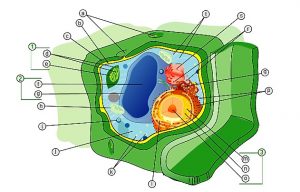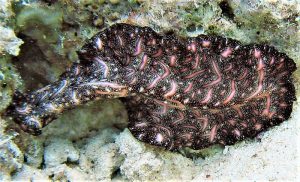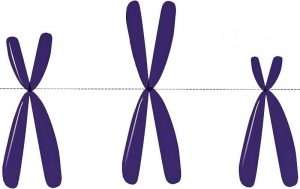Cell organelles
The human body does thousands of things at once, from sending electrical impulses, pumping blood, digesting food, producing protein, and many more. All these activities you can do thanks to the cells, those tiny units of life that are like factories, full of machinery designed to carry out the business of life. Cells are all living things, and they can have different shapes and sizes. Despite this wide range in size, shape and function, all these small factories have the same basic machinery. The term cell organelle is used in the branch of cell biology and is used to refer directly to the subunits or components of the cell that are located in the cytoplasm and that perform a certain function. They are also called organelles, organoids or cell elements.
What are cell organelles?
Cell organelles are the components of cells whose function is to provide life, proper functioning and the correct metabolic process to each cell of the organism. They are also called cellular elements and are found inside the cytoplasm.
Characteristics of cell organelles
Some important characteristics of cell organelles are the following:
- They are also called cellular elements.
- They are located within the cytoplasm.
- They are found more frequently in eukaryotic cells than in prokaryotic
- They can be classified according to their shape.
- The presence of cell organelles depends on the type of cell and the type of organism.
- Cell organelles have different characteristics depending on the organism in which they are found.
- It is part of cells and has different functions.
- They are delimited from the rest of the cytoplasm.
- Their specialization role has played a very important role in evolution.
- The number of organelles we can find is very changeable, it depends on the cell and varies depending also on the function.
- Some organelles contain their own genetic material, such as mitochondria and chloroplasts.
- Some organelles do not contain genetic material.
Structure of cell organelles
The structure of the organelles is divided into:
- Cilia and Flagel: They allow the cell to move and give mobility to other cells or to move particles on its surface.
- Ribosomes: Formed by the combination of proteins and RNA. The ribosome reads the RNA and binds the protein to the amino acids supplied by the transfer RNA, known as protein synthesis.
- Cytoskeleton: Gives internal support to the animal cell. Formed from three types of fibrillary proteins: microtubules, intermediate filaments, and microfilaments. It maintains the shape of the cell, gives it mobility, and assists in intracellular transport.
- Golgi Apparatus: Receives immature proteins from the rugged endoplasmic reticulum and releases vesicles whose function is to deliver mature proteins.
- Endoplasmic reticulum (ER): A system of membranes similar to a set of sacs. It includes the rugose ER and the smooth ER. The first one is joined to the ribosomes, which allows the synthesis of some of the proteins of the cell to be completed.
- Lysosome: Degrades nutritive particles or bacteria or harmful materials that the cell directs to it.
- Vacuole: Characteristic of the plant cell. It stores water, enzymes, secretion products and waste.
- Mitochondria: Long organelles surrounded by 2 membranes that provide energy.
- Plastids: Own plant cell and can be classified as chloroplasts, leucoplasts and chromoplasts.
- Cell Nucleus: Directs all cell activity because it contains DNA. In animals it is found in the center of the cell, in plants on one side.
- Nucleolus: The process of biogenesis of ribosomes to form pre-ribosomal RNA.
- Cell Membrane: Responsible for controlling chemical substances in the cell, reacts between stimuli caused by external substances.
Functions
Some general functions of the organelles are:
- To protect the cellular content.
- To regulate the different cellular activities.
- They are in charge of protein synthesis.
- They provide an adequate surface for the chemical reactions of the cells.
- Synthesize carbohydrates, lipids and glycoproteins.
- To obtain carbon dioxide, water and adenosine triphosphate to make energy-rich compounds.
- They digest substances foreign to the organism and microbes.
- They help the movement, structure and shape of cellular organisms.
- Allow the movement of particles along the cell surface.
Types of cell organelles
- Organelles of the vegetable eukaryotic cell: Plastids, amyloplasts, leucoplasts, lycopene, carotenoids, chromoplasts, protein plasts, elaioplasts, chloroplasts, vacuoles and cell wall.
- Plant and animal cell organs: Plasma membrane, ribosomes, lysosomes, peroxisomes, Golgi apparatus, microtubules, Smooth Endoplasmic Reticulum, Rough Endoplasmic Reticulum, Mitochondria, Nucleus, Nucleus and chromosomes.
Examples of cell organelles
- Dictyosomes: This is the name given to the Golgi apparatus found in vegetables. Its function is similar to the Golgi apparatus, but in the vegetable organism.
- Central vacuole: It is the same vacuole, but it is only found in plant cells.
- Vesicle: They are in charge of storing, transmitting or directing cellular waste.
- Melanosome: It is found inside animal cells and is in charge of storing pigmentation.
How to cite this article?
Briceño V., Gabriela. (2019). Cell organelles. Recovered on 23 February, 2024, de Euston96: https://www.euston96.com/en/cell-organelles/










